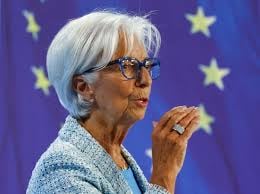ECB's Lagarde Foresees Challenges on the Path to 2% Inflation

Despite the European Central Bank (ECB) cutting rates by 25 basis points in June, President Christine Lagarde emphasized the uncertainties facing the euro area's economy.
Speaking at a recent event, she cautioned against expecting a straightforward path for future rate cuts, emphasizing the ECB's dedication to making decisions based on data.
She acknowledged the resilience of the Eurozone's recovery, particularly regarding unemployment, but noted the persistent challenges, especially in services inflation. The latest inflation report showed a decline in the headline rate from 2.6% to 2.5% in June, while core inflation and services inflation remained elevated.
Lagarde explained that the complexities of services inflation are partly due to delays in wage negotiations across Europe, where agreements are sometimes renegotiated every three years. This has led to a catch-up effect, contributing to higher service costs. She emphasized the need for a balanced approach to inflation, taking into account different inflation rates for goods and services.
What Does This Mean For Me?
Discussing future rate cuts, Lagarde highlighted the ECB's cautious approach and the influence of U.S. monetary policy. She expressed skepticism about a return to near-zero interest rates in the current context but remained hopeful for a stable economic environment without imminent shocks.
Lagarde also emphasized the significance of fiscal governance within the European Union. She commended the new fiscal framework that replaced the Growth and Stability Pact, emphasizing the need for member states to manage debt and prioritize productivity and investments aimed at growth.
More News
.webp)
Japan’s Rate Shift Is Rippling Through Global Bond Markets
1 week ago

China’s Growth Engine Stalls as Consumers and Investors Pull Back
1 week ago

Egypt’s Recovery Gains Traction as Household Pressure Lingers
2 weeks ago

OECD Warns AI and Tariffs Will Test the Global Economy
3 weeks ago

Zero Tariffs, Higher Drug Bills as US and UK Reset Pharma Trade
3 weeks ago

Catastrophe Bonds Go Global as Climate Risk Meets Yield Hunting
4 weeks ago
.webp)
Canada Shields Steel and Lumber Industries From Tariffs
4 weeks ago

Trump Drops Selected Tariffs in Response to Inflation Pressures
1 month ago